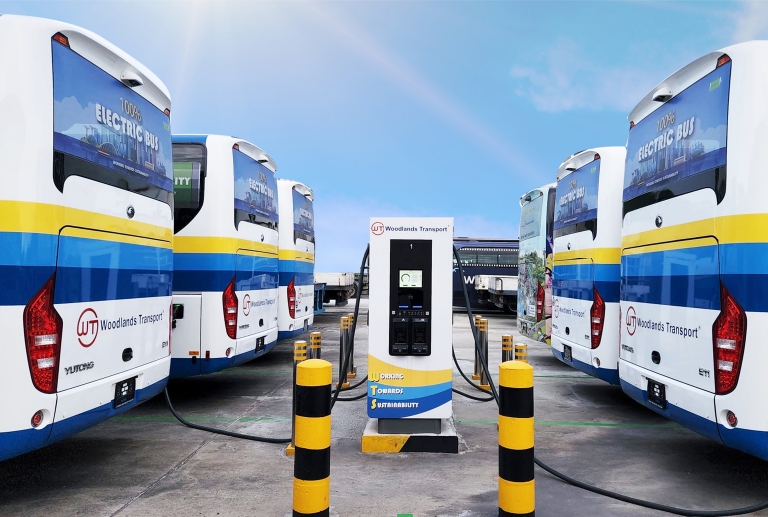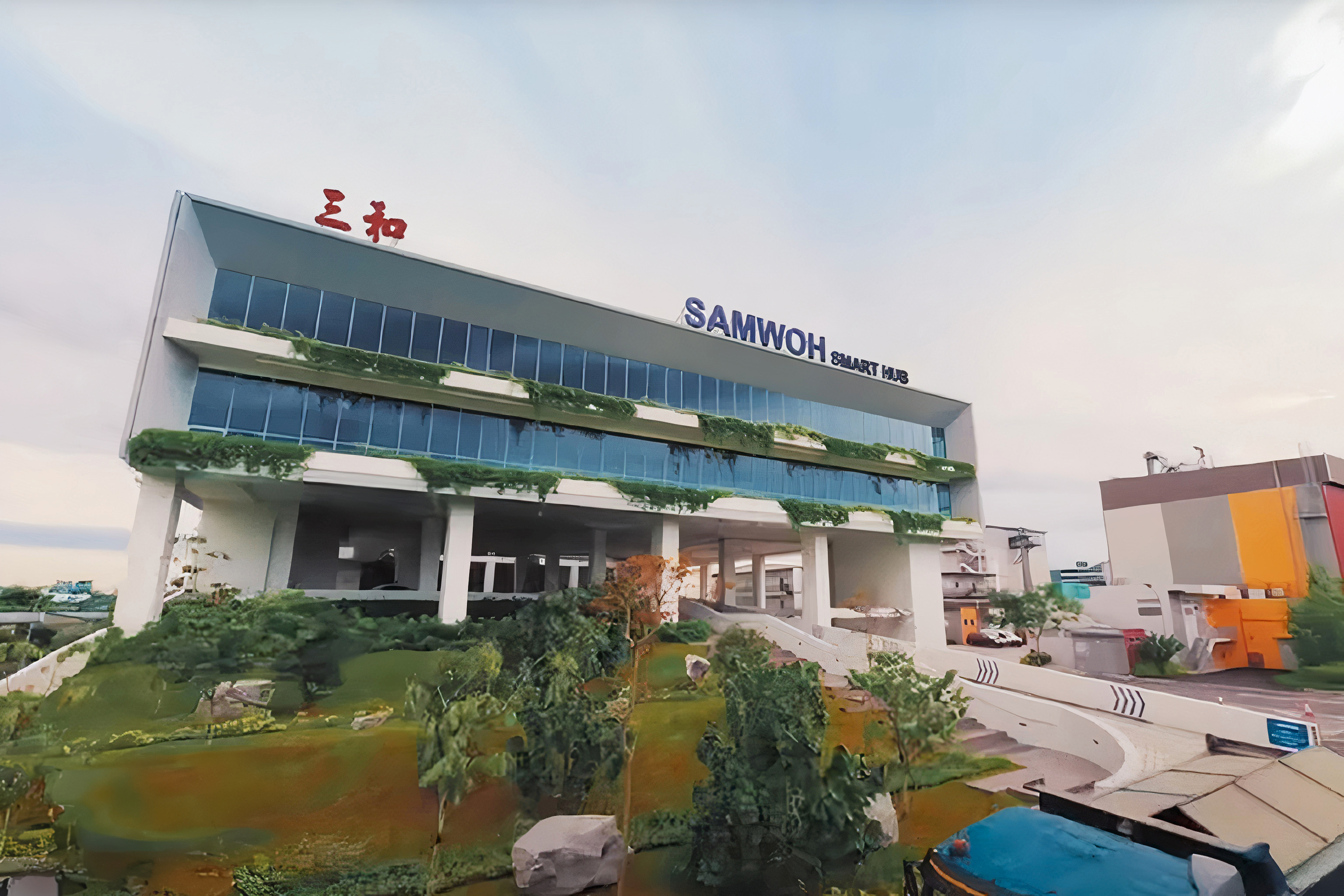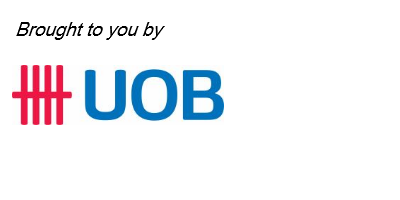BRANDED CONTENT
Increased access to capital and support for ESG efforts: How SMEs can benefit from Budget 2024 enhancements
The initiatives, together with UOB’s green financing solutions, can help small businesses defray transition costs, says the bank’s head of Group Commercial Banking Eric Lian

With help from UOB, Woodlands Transport was able to finance its new fleet of green vehicles. PHOTO: WOODLANDS TRANSPORT
Follow topic:
As the world races towards net-zero emissions, resources-strapped small and medium-sized enterprises (SMEs) have been given a boost through enhancements to several existing schemes to help them integrate more environmental, social and governance (ESG) practices into their operations. The enhancements were announced recently during the Budget 2024 speech.
The enhanced support for loans under the Enterprise Financing Scheme (EFS), for instance, is a positive step towards helping SMEs embark on sustainability, says Mr Eric Lian, head of Group Commercial Banking at UOB.
The new financial measures, he explains, address a key issue that has been holding many SMEs back from implementing sustainable practices – increased costs associated with going green.

According to the UOB Business Outlook Study 2024 (SMEs & Large Enterprises), which surveyed 800 businesses in Singapore, more than seven in 10 SMEs believed sustainability is important. However, less than four in the 10 have implemented green processes, citing concerns of passing the higher costs to customers, among other reasons.
This is why enhancements to the EFS are a boost for cost-conscious SMEs, as they adapt and adjust amid higher inflationary pressures and geopolitical tensions.
More incentives for environmental sustainability
As announced in the Budget 2024 speech by Deputy Prime Minister Lawrence Wong in February, the enhancements to the EFS comprise several upgrades.
For one, the EFS – SME Working Capital Loan was permanently increased from $300,000 to $500,000 to provide relief for operational cashflow.
Maximum loan amounts of $10 million for the EFS – Trade Loan and $15 million for the EFS – Project Loan will also be extended until March 31, 2025, to support companies’ internationalisation efforts and domestic construction projects, respectively.
Meanwhile, the EFS – Green scheme will be extended by two years to 31 March 2026, and will now support green solution adopters in addition to green project developers and system integrators.
With this increased access to capital, which can alleviate the high cost of new equipment and licensing, SMEs will be incentivised to transform their business models and adopt more sustainable practices.
The reception to the EFS enhancements has been positive so far. Mr Lian shares that UOB loans extended under the EFS – Trade Loan rose by 19 per cent from April 2023 to March 2024, up from 7 per cent in the previous period.
UOB Business Outlook Study 2024 (SMEs & Large Enterprises) – Singapore in brief
- More than seven in 10 businesses believed that sustainability was important
- Less than four in 10 have implemented sustainable practices
- Main barriers included higher costs for customers (29 per cent); insufficient knowledge and know-how (28 per cent); and lack of manpower and resources (26 per cent)
- Businesses wanted more tax incentives or rebates (33 per cent); and easier access to funding or grants (33 per cent)
Helping SMEs kick-start their sustainability journey
Another key challenge among SMEs is insufficient knowledge and know-how, which hamper their ability to implement green solutions.
For companies that do not know where to start, tools like the UOB Sustainability Compass can be helpful. By assessing the businesses, providing advice on evolving regulations, sharing what needs to be done and recommending financing solutions to aid in net-zero transition, the tool can give business owners more clarity on how and where to begin their sustainability journey. Since its inception, more than 1,600 SMEs in Singapore and Malaysia have made use of the tool to become greener.
During his Budget speech, DPM Wong also announced improvements to the Energy Efficient Grant, by including more sectors in its scope of financing support. From food services, food manufacturing and retail, the scheme will now be extended to cover manufacturing, construction, maritime, and data centres and its users.
Given the various support schemes out there, UOB helps SMEs understand how they can access the most suitable assistance, whether it is UOB’s sustainable financing solutions, or loans under the EFS where the bank is partnering with the government, says Mr Lian.
“We are not just selling green loans. Through the Sustainability Compass, we provide solutions. And when you come onboard with us, we connect you with the agencies and vendors you need to start your sustainability journey,” he explains.
UOB’s Sustainability Compass
- Industry-first online tool designed to help SMEs start their green journeys
- Customised reports identify SMEs’ sustainability maturity, advise on regulations and recommend green financing solutions
- Used by over 1,600 SMEs in Singapore and Malaysia since its launch in October 2022
Finding success in going green
Take Woodlands Transport Service and commercial car distributor Hong Seh. Besides providing financing, UOB connected them with vendors to help them build the infrastructure for electric vehicle (EV) charging points.
Woodlands Transport Service now enjoys greater refuelling savings with its new fleet of green vehicles, while Hong Seh is looking to expand its portfolio of EV brands. Both had tapped UOB’s U-Drive solution, which connects players along the entire EV value chain, from dealers and charging-point operators to end-users.
Aside from U-Drive, customers can tap UOB’s U-Solar solution to connect with solar services providers, while those aiming for energy efficiency can consider the energy services providers under U-Energy. U-Build supports the green efforts of builders and developers.

For Samwoh, a Singapore-based engineering and construction company, its ambition for a greener built environment sector led to the launch of its new headquarters, Samwoh Smart Hub. UOB was integral in supporting the construction of Samwoh Smart Hub, providing tailored solutions and expertise through the UOB Sustainable Finance Framework for Green Building Developers and Owners.
The facility is built using 100 per cent recycled construction materials and relies on smart building management systems to minimise energy consumption. Through close to 2,600 solar panels, the building generates enough energy to achieve a net energy surplus. Its headquarters is Singapore’s first energy-positive industrial building and among the few to be awarded the Building and Construction Authority’s Green Mark Platinum Positive Energy certification.
As of end 2023, UOB extended around $6.1 billion – a nearly 77 per cent increase from the year before – to over 400 SMEs through its sustainable financing solutions. The trend is likely to continue as companies become increasingly aware of the competitive advantage of going green.
“Companies now understand that sustainability needs to be part of their business agenda. Instead of thinking about the initial cost, they can look at the benefits, such as increased market share. Consumer buying behaviour is now increasingly driven by sustainable practices, and stakeholders along the supply chain want to work with green partners. Those not on this journey may find themselves becoming irrelevant,” says Mr Lian.


